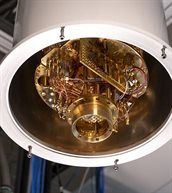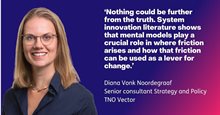Want to learn more?
Read the research 'Critical Raw Materials for Quantum Technologies Towards European technology sovereignty in an emerging industry'
Quantum technology is an emerging, strategic technology with applications in both civilian and military domains. This includes quantum computers as well as quantum communication networks and sensors, and this technology is expected to have a significant impact on society.
In addition to the complexities involved in developing the technology itself, it is important to consider the overarching strategic issues.
For example, how do we in the EU ensure that we remain at the forefront of innovation? And where do we source the key components and materials we need in the Netherlands to develop quantum technology systems?
The strategic importance of quantum technology and all the challenges it poses in terms of resource policy make it eminently a topic where TNO Vector experts want to delve a little deeper to come up with new insights.
Waiting for a breakthrough
With geopolitical tensions around the world, there is much more focus within Europe on the strategic importance of disruptive technologies. And quantum technology is one of four technology areas that the European Commission classified as ‘critical’ last October.
As it stands, few raw materials are needed to meet the needs of quantum researchers in R&D. ‘But that picture could look completely different in the future,’ stresses Julian Rabbie, quantum technology consultant at TNO Vector.
‘If there is a breakthrough, the demand for the materials needed for that type of quantum system could increase at lightning speed. Bottlenecks are then likely to form mainly around certain specific isotopes and semi-finished products, rather than raw materials themselves.’
Still a lot of uncertainty
Exactly which materials will be needed then? This is very difficult to predict at the moment, according to Rabbie. ‘There are several ways to make quantum technology systems, but it’s not yet clear which platform will come out on top. And that brings uncertainty.
That’s why our scope included the most important materials for the various technologies that researchers in the Dutch quantum ecosystem are working on. So we took a broad view.’
Talking to the experts
One major challenge when taking stock was that there is hardly any quantitative information available on the raw materials and semi-finished products needed in quantum technology experiments.
‘There were just studies that touched on the subject only briefly,’ Rabbie recalls. ‘That meant talking to experts who carry out the experiments themselves. Thanks to Quantum Delta NL's network, we had access to the right people willing to share this information with us. Without these experts, we couldn’t have gone into the kind of depth that we did.’
Focus on technical aspects
While talking to experts, it soon became clear that they weren’t always concerned about availability of certain materials in the future.
Quantum technology is so complicated that it’s a big enough job to create tiny particles (qubits) so that they exhibit the special behaviour (superposition and entanglement) needed at the right time, to perform complex calculations for example. So, it doesn’t help if they also impose raw material constraints on themselves when experimenting.
Anticipating the next step
Rabbie understands the experts’ focus very well. ‘It's a miracle anyway that something as unique as quantum technology is possible in the first place. And at this stage of research, if experts also have to start considering where the materials needed for the experiments will come from, then that can be quite prohibitive
But as we focus on the future, it is very important to be aware of this. This is also why it’s so important to have a picture of the materials needed and what bottlenecks might arise in the future, so that there is still time to respond strategically and proactively.
We have previously done a similar analysis for the hardware components needed for quantum computing and quantum communications, and later this year we will be doing one for quantum sensing. In Europe, we need to avoid any future delay in quantum technology because we cannot get the essential components and materials fast enough.’
Bottlenecks
So, while there are more than enough materials available for current experiments, that could change quickly if there is a breakthrough and a specific quantum technology lends itself to mass production. There is a firm warning in the report published on the back of the assessment, one of the authors being Rabbie himself.
‘As an example, we mention helium-3. This is an isotope that is a natural by-product in the production of certain nuclear weapons and is also used for medical purposes. Buyers will therefore not only have to face large price fluctuations, but will also have to take into account reduced supply due to geopolitical tensions. So, that really does present a potential bottleneck. What’s more, when taking stock, it was clear how much we depend on a limited number of countries, especially China, for many raw materials used for quantum technology.’
Positive feedback from Brussels
The European Commission is paying close attention to the availability of raw materials. A risk assessment for a number of critical technologies is currently under way, including raw materials for quantum technology. Rabbie explains: ‘We heard from Brussels that we are frontrunners in the Netherlands in that field.
Within the European Union, we are the first who have been able to indicate exactly where we stand and where the risks are, based on interviews with experts. And that helps to bring the issue of resources into focus more.
The logical next step would be to carry out this stocktake at EU level, as was done previously based on our methodology for doing the same thing for critical hardware components. The issue is high on the policy agenda at least, so it seems to be moving in the right direction.’
Finally, Rabbie would like to stress that doing this sort of stocktaking is right up TNO Vector's street. ‘It's not just about the technology perspective, but really about the overarching picture, where you also have to look at policy issues and geopolitical developments.
It’s great to have so many experts in different fields at TNO. It means you may bump into a colleague who is an expert on raw materials or supply chains, and can ask them a question and bounce ideas off them.



